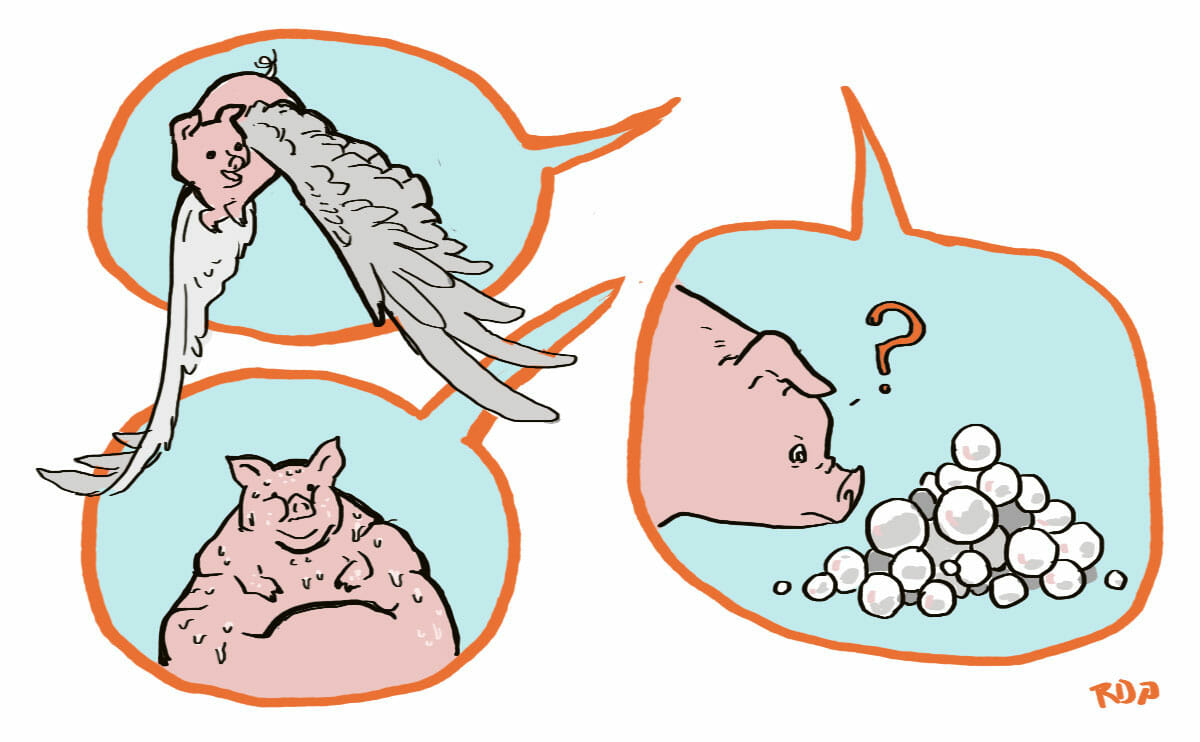Pig-like humans are stereotypically fat, ugly, lazy, disgusting, sexist, selfish people who take more than their fair share. They are road hogs, ball hogs, glory hogs and resource hogs. Why is the word pig so pejorative?

Which is not to say other farm animals are lucky enough to escape negative stereotypes. Chickens are cowardly, geese are silly, mules are stubborn, sheep are easily led astray. And pigs do score a few linguistic positives: there’s the game of counting babies’ toes using the nursery rhyme “this little piggy went to market”; there are expressions like “happy as a pig in clover“; there are playful compounds like “pigtails“, or useful ones like “pig iron” – and pretty much anything involving “bacon”.
So let’s get out the hedonometer.
A couple of years ago, Peter Dodds and his colleagues at the University of Vermont decided to build a Happiness Meter. Being academics, they translated the “happiness” part into Greek, and called it a hedonometer. And because they wanted to measure happiness in Twitter messages, rather than up close and personal in actual humans, they based it on all on words. Specifically, they used a list of 10,222 words that they created by merging the commonest 5,000 words in four text sources (Twitter, Google Books, music lyrics and The New York Times), and they asked a large number of people “to rate how a given word made them feel on a nine point integer scale, obtaining 50 independent evaluations per word.”
The happiest three words on their list are “laughter” (with an average rating of 8.50), “happiness” (8.44), and “love” (8.42), while the unhappiest words (numbers 10,220 to 1,0222) are “rape” (1.44), “suicide” (1.30) and “terrorist” (1.30). And among farm animals, alas, pigs are hedonometrically dead last:
| Rank | Avg. Rating | |
|---|---|---|
| horse | 809 | 6.80 |
| chicken | 1483 | 6.40 |
| lamb | 1551 | 6.38 |
| duck | 2083 | 6.18 |
| sheep | 2184 | 6.14 |
| cattle | 2295 | 6.10 |
| cow | 3301 | 5.82 |
| pig | 8132 | 4.76 |
| pigs | 8476 | 4.62 |
It may be some consolation to learn that “bacteria” (rank 9439, average rating 3.61) and “politicians” (rank 9627, average rating 3.34) come out even lower than pigs do. And while “pork” is only a bit better (rank 7301, average rating 4.98), “bacon” is way up there between “cattle” and “cow”, with a rank of 2761 and an average rating of 5.96.
At this point we turn away from the hedonometer, but we’ll still quantify our impressions by counting phrase frequencies in a large (billion-word) collection of English web text. As we’d expect, most of the common similes involving pigs and hogs involve negative qualities: the commonest adjectives in the frame “__ as a pig” are greedy, fat, sick, ugly, sweaty, obstinate and ignorant. Well, actually, happy is at the top of the list: but the rest of the cliche usually turns the positive vibe into a negative one, since people are mostly said to be “as happy as a pig” in a vulgar word for excrement, with “clover” more than a factor of ten less likely.
In contrast, the frame “__ as a horse” gets adjectives like healthy, strong, wild, steady and hungry.
Some piggish expressions are catchy but mysterious. For example, someone or something that’s “as independent as a hog on ice” might be awkward and out of control, which makes sense – but they might also just be stuck in place and stubbornly independent. That second interpretation apparently comes from a figurative use of “hog” to mean “a curling stone left part way along the course.” Similarly, it’s not obvious why someone who’s overacting is “hamming it up” – but the dominant theory is that this comes from a 19th-century minstrel song “The Ham-Fat Man”, and perhaps before that from the use of ham fat to remove black-face makeup. And why should you avoid buying “a pig in a poke”? Because if you don’t look in the bag until you get home, the freshly-killed suckling pig you bought from that nice man at the market might turn out to be a dead cat.
Most of these phrases are more transparent than “blind pig,” but few of them are at all flattering to Sus scrofa domesticus. You’d better not plan on waiting until the day “when pigs have wings” or “when pigs fly.” And if you want to be a success, don’t waste your time putting “pearls before swine” — “what can you expect from a pig but a grunt?” Just get right in there and “root hog or die,” because if you don’t make it, you might end up like the “pig in the python,” passively transported from one end of a long digestive system to the other. One of the best outcomes you can hope for is to be “as happy as a dead pig in the sunshine.”
These sayings are just a few of the thousands of pig, hog and swine idioms in the English language – so maybe the pig PR department can hope to make up in volume what it misses in warmth.